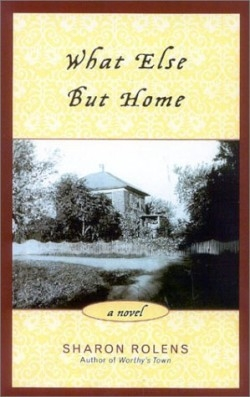What Else But Home
East of Eden and south-south-west of Chicago, Old Kane, Illinois in 1948 is a tiny yet teeming crossroads of family strife, populated by amiable prodigal sons, practical-sounding patriarchs, and the women who love them. Its denizens? various sins (incest, sodomy, adultery, murder, euthanasia, robbery, atheism, mild profanity, and the inability to last beyond chapter five of Norman Mailer’s The Naked and the Dead because it’s too vividly naked), are mingled with such genteel aplomb that the novel itself might be taken as a tribute to the redemptive power of nostalgia over the lure of yellow journalism.
Drayton Hunt, forty-eight, unemployed, and newly sprung from prison for a crime (of his many crimes) he didn’t commit, wants to talk to his resentful illegitimate son, Cappy Giberson. Cappy, twenty-three, newly graduated from journalism school and semi-employed as a St. Louis-Dispatch freelancer, is too tongue-tied to talk to the spunky co-ed Oleeta Hetzel, who serves at the local diner and ponders her future outside Old Kane.
Meanwhile, Cappy’s custodial father is technically his grandfather: the seventy-three-year-old widower, Worthy Giberson (Worthy’s sole daughter Chastity spent an afternoon in the hayloft with Drayton and died giving birth to Cappy). Worthy is still keeping an eye out for his own runaway son, Tick Giberson, a thirty-three-year-old bleached blond reformed speaker of tongues on the shilling evangelical tent circuit. (That the three bachelors don’t come to blows vying for the common sense salvation of Oleeta merely means that profane reading habits die hard.)
It will take the confession of an Amish-turned-Baptist minister who cries easily, a murder trial, and the promise of a publishing contract to put old Worthy’s stories in a book to set the record straight.
The author is resourceful enough to entertain her readers with a well-built window on a vanishing world. A sequel to the Literary Guild selection Worthy’s Town, a look at Worthy’s days in 1920 Old Kane, What Else But Home is Rolens’s second novel, and the graceful entrances and exits of her various story arcs create a pleasant rhythmic flow of local scenery, much like the well-preserved 1924 Moon Chevy that Drayton coaxes back to running form. By the final page, when Old Kane’s newest bride and groom light out for Kingdom City, Missouri, that town’s parishioners are going to hear a powerful tall-tale testament of a love and redemption by one reformed safe-cracking preacher.
Reviewed by
Leeta Taylor
Disclosure: This article is not an endorsement, but a review. The publisher of this book provided free copies of the book to have their book reviewed by a professional reviewer. No fee was paid by the publisher for this review. Foreword Reviews only recommends books that we love. Foreword Magazine, Inc. is disclosing this in accordance with the Federal Trade Commission’s 16 CFR, Part 255.

